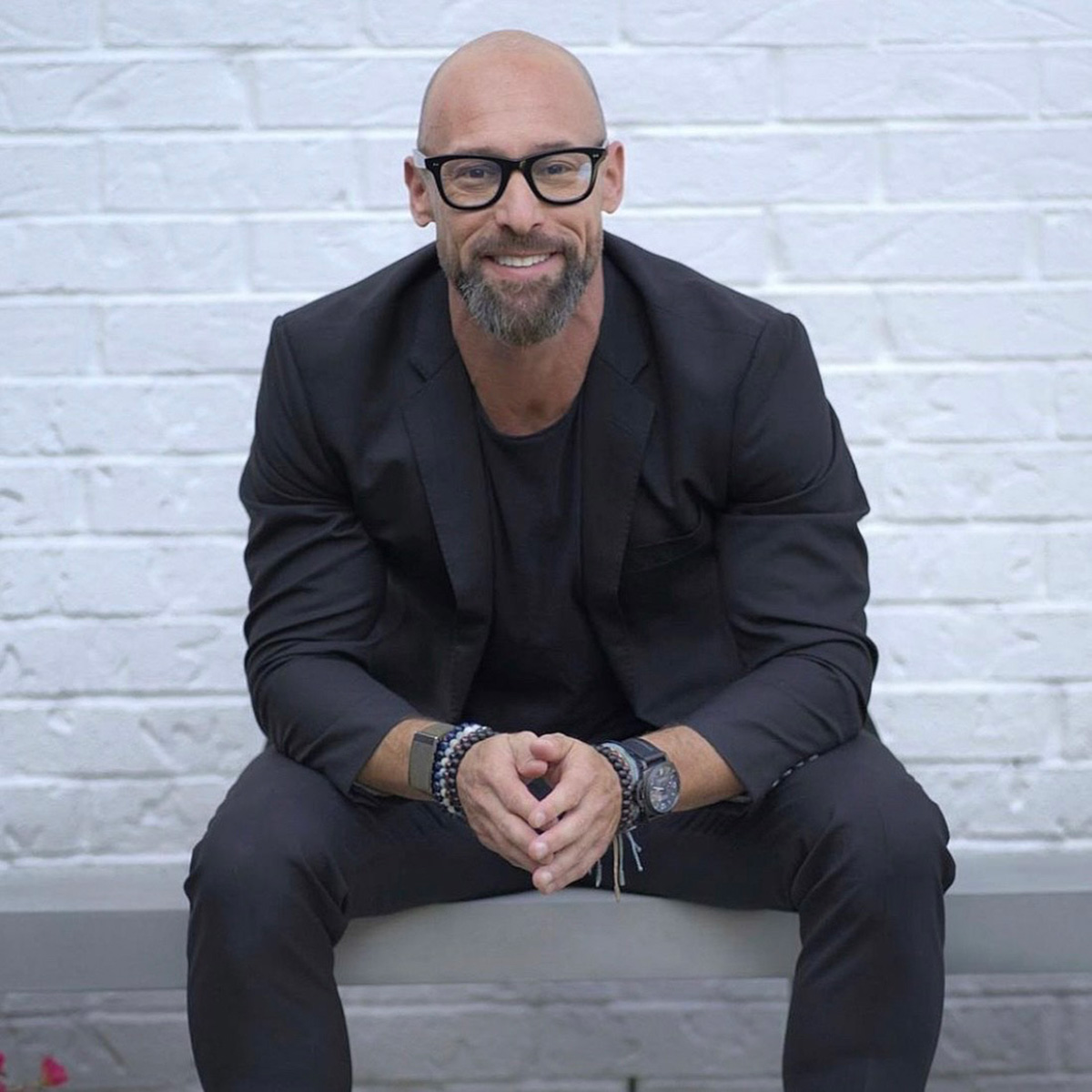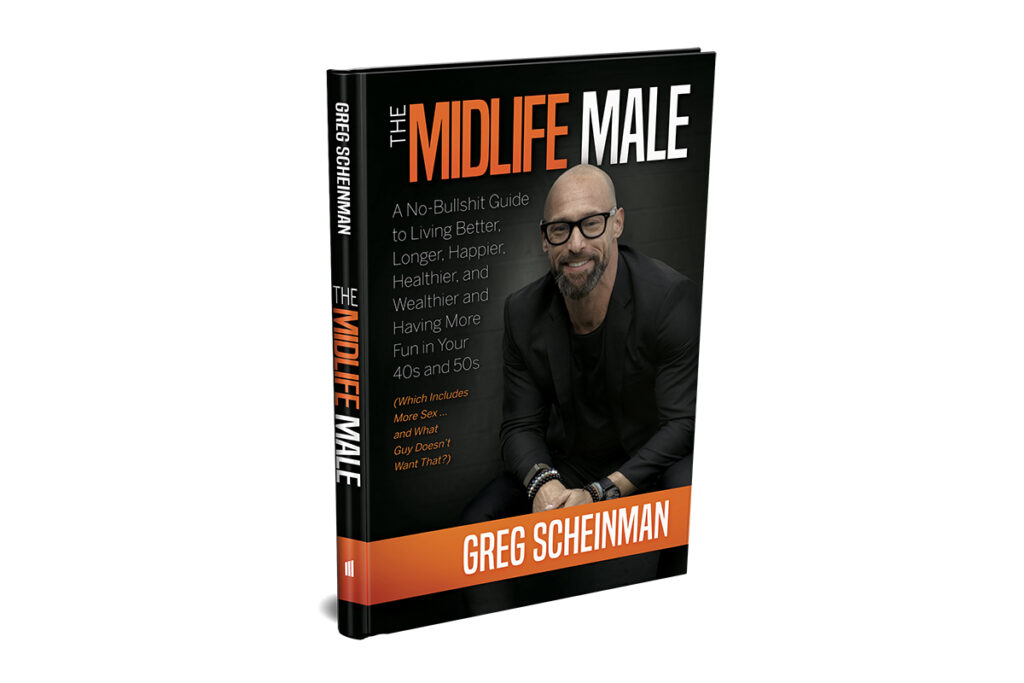
HOW TO GET MORE OUT OF MIDDLE AGE
With his new book, The Midlife Male, Greg Scheinman embarks on a mission to help middle-aged men stop chasing the wrong things, focus on what’s meaningful, and wind up having more money, fun, and sex than ever before. His solution is simple, but far from easy.
INTERVIEW BY MATT TUTHILL
ROBERT IRVINE MAGAZINE: Your book, The Midlife Male, starts with you asking the reader to have this moment of self-acceptance; get in front of the mirror, drop the towel, stare at everything, accept everything. I kind of get intrinsically why that works, but I want to know why you think it works and also it’s such a hard step. Does it have to be step number one and why?
GREG SCHEINMAN: I think it’s so difficult for men in particular because we don’t spend a whole lot of time or feel comfortable being uncomfortable and really thinking about what’s most important to us and what matters most and stripping away the traditional kind of metrics for success, which, for a guy, is salary and title. We’re going to go to school and then we’re going to get a job and then we’re going to get married and we’re following these paths.
But when do we take the time to really stop and think about what it is that we really want? What do we want our life to look like? What does success really look like for us? You have to start there because until you know what’s most important, how do you go from there? Until you know where you’re going, how are you going to get there? How do you develop your plan—your life by design—until you really answer those questions? You’ve got to take that look in the mirror and look at yourself first, and you’ve got to look inward before you look outward.
The reality of it is, I didn’t do that for a long time. I followed all the other paths and they didn’t work out so well. They didn’t feel authentic, they didn’t feel genuine, they didn’t result in success that I was feeling—even though from the outside looking in, it looked great.
RI: The midlife crisis cliché of the sports car and the floozy on the arm after the divorce, that’s where this comes from, right? The failure to have this moment of honesty? If you don’t have that, you run out and grab the flashiest things that you think will signal to others that everything’s okay.
GS: Yeah, I think chasing authenticity where authenticity doesn’t exist is exhausting. It really is. This accumulation of things, whether it’s retail therapy, whether it’s cars, whether it’s watches, whether it’s monetary success, whether it’s what you’re wearing, you know, the grass is always greener mentality. Those clichés and those stereotypes are unfortunately true with good reason, because the majority of men are falling into those traps. And in a lot of cases they over-index. I talk about the over-indexing trap. They over-index at work, chasing these things at the expense, again, of what real success, what real happiness looks like.
But I’m also big believer, clearly, that you can change at any age, at any stage, and at any time. I know really old 30-year-olds. I know really young 60-year-olds. I don’t think there’s a specific time or a specific tipping point where it happens to all guys. I think it’s different for all of us. The real big question is how do we work ourselves through it and how do we work ourselves out of it?
RI: The term over-index, that sounds like a financial term that is being brought to bear in some other kind of use here. Can you break that down? What you mean by over-index?
GS: One of the things I talk a lot about is that you should run your life like you run your business. For men in general, they understand or have a better understanding of how to run businesses and they over-index. What I mean by that is they spend more time operating and running their businesses and looking at the metrics of that quantifiably, more objectively, even more passionately there.
And they wouldn’t accept underperforming months, quarters. They would act to change it and to become more successful, if you will. More profitable, more efficient, more effective. They will look at and use those words and those terms in business all the time, but more often than not, they’re not using the same frameworks to run their life.
What you want is a more balanced portfolio—another business term—of assets and their allocation. Just like you wouldn’t own one stock, you wouldn’t put all your eggs in one basket, this is where my success concept came from. Instead of salary and title being the metric or definition of success for men, what if it was more holistic?
That’s how I developed my six F’s and what I work on with men today; it’s how do we turn our F’s into A’s to live the life we deserve? My six F’s are family and fitness and finance and food and fashion and fun, and identifying what’s really important to you and what does balance look like in that regard? You can be a lot wealthier and feel a lot better with a more balanced life portfolio.
RI: Before you had that moment of honesty with yourself, what did your life look like? What was the kind of stuff you were going after?
GS: Instant gratification, retail therapy, appearances, what other people thought, doing things for either the financial reward, the praise, the acceptance, going along to get along, more of the herd mentality, the group mentality.
You get really caught up in kind of conformity, which can become redundancy and complacency and being in situations and circumstances that don’t necessarily feel genuine and the best for you, but they’re hard to get out of.
But they don’t fulfill you so now you’re drinking a little bit too much and you’re staying out a little bit too late, and you’re not getting up and going to the gym like you wanted to in the same ways because you’re in these scenarios, circumstances, and situations where you’re not the one really steering the ship.
You’re not the one really designing your days and your life. You’re just kind of going along with it and before you know it, five, 10, 15 years can pass you by that way.
RI: You literally just took the next question out of my mouth with the mention of not getting enough sleep. My wife and I do that a lot because we just feel like we need a break—you sit up, watch a show, have a drink. There’s no knowledge gap here. We know we should be getting to bed so that we’re rested so that we can work out in the morning. How do you break that cycle?
GS: Probably the top thing that I hear from guys that even reach out to me is that, “Man, I know what the fuck to do; I’m just not doing it.” Why not? As guys, we also talk about consistency. Like, “Oh, I’m not consistent in this area, or that. You’re consistent, but you’re just consistently making poor choices, and you know the better ones and you continue to make the same choices over. So how do we give you the tools and the confidence and the security and the supports to start making better choices?
The answer is to start small. If you’ve been drinking 10 Diet Cokes a day for 10 years… you could stop cold turkey or say I’m going to swap one of them out for water. And we’re afraid a lot of … Where am I going to find my support? Where am I going to find my friends? How do I even get started? When do I get started? It’s never the right time, so when do I do it?
And that’s a lot of this stuff that is in the book, and it led me down that path to figure out how, and these were topics and subjects that I wanted to explore. So what did I want? I wanted to talk to guys that were smarter than me and that seemed more successful to me and seemed like they had it figured out, and that’s how the podcast started.
So what I’ve learned is: Today is that day, and I say that all the time. One of the things that I really wanted to do with the book was make it a book to that effect that anyone could pick up, open any page, really, and get one thing at least out of it. You don’t have to read it cover to cover, or even in its entirety.
You should open it up from anywhere and get something that hopefully can help you, motivate you, inspire you that you can learn from because what’s the thing that you can do if you are stuck? I think you’ve got to simplify it. Make it one thing.
Seriously, swap one soda for water. Give your wife a kiss in the morning before you go off to work when you’ve taken her for granted for the last year or something. Take one thing. Go for a walk. Read five pages or one page of a book. People are overwhelmed. People that are stuck, they get this kind of paralysis by analysis.
Just pick one thing, whatever it is. And make it small, make it manageable. That adage about 1% better every day? It rings true. If you keep doing it every day, the compound interest effect is astounding how much progress you can make.
Follow Scheinman on TWITTER and INSTAGRAM, and order his book HERE.



